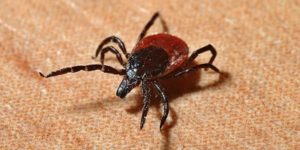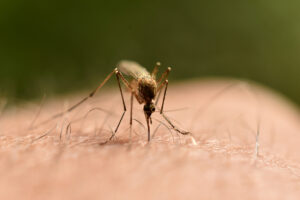 HYANNIS – Officials in Barnstable County are preparing for a new tick species which could eventually end up on Cape Cod.
HYANNIS – Officials in Barnstable County are preparing for a new tick species which could eventually end up on Cape Cod.
The Asian longhorned tick, which has been known to be a pest for livestock but can also spread diseases to humans, has been found in eight U.S. states including New York, New Jersey and Pennsylvania.
It was discovered last year in New Jersey on a sheep farm.
“Once it got reported to be in Westchester County, New York, I said, ‘okay this thing is on our door step and it is just a matter of time,” said Larry Dapsis, the Barnstable County Entomologist and local tick expert.
There is a concern about how quickly the species can spread.
“The females do not need a male. They do not need a mate in order to lay eggs,” Dapsis said. “They are already fertile and they just start laying eggs as soon as they become an adult tick and the populations can grow very, very fast.”
The tick may have been in the U.S. since 2010 and has been misidentified as a rabbit tick, according to Dapsis.
“The fact that it’s found in a number of states in a short period of time, including Arkansas, it suggests that this thing probably wasn’t a single introduction,” Dapsis said. “It’s been introduced a number of times.”
Genetic evidence supports it has been introduced in the country at least three times.
The longhorned tick does prefer livestock such as cows, sheep and horses.
“After its introduction it’s probably being moved around by interstate commerce,” he said. “We are moving animals from state to state so that is probably how it is traveling.”
The possibility that birds may be playing a role in its movement has not been ruled out.
Dapsis believes once the species arrives in Massachusetts it will be more of a problem for areas with more cattle farms and not on Cape Cod.
The species could potentially be a big annoyance because it is not known how it spreads diseases.
“In Southeast Asian, where this thing is indigenous to, it will harbor pathogens that resemble but arne’t exactly like our pathogens in deer ticks that cause anaplasmosis, Powassan virus and babesiosis,” Dapsis said.
Studies are being conducted on mice and other animals to see if the ticks will be able to transmit the pathogens already here.
“In the surveillance that’s been done so far, the pathogens that exist in Southeast Asia have not shown up in the tick populations established here,” Dapsis said. “That’s kind of good news, but can it make existing use of what’s already here and that we don’t know.”
Dapsis said it will eventually be another tick that residents on the Cape will probably have to be aware of.
“The basic protection tactics that we have been preaching for years now, permethrin treated clothing and footwear and perimeter yard sprays, should prevent these things from being a big annoyance,” he said.
Dapsis said the Cape is currently in a safe point in the tick season.
Deer tick eggs laid in the spring are hatching into tiny larvae that can barely be seen.
“The good thing about that is that the larvae hatch out clean. They are not carrying disease,” he said.
In early September the region will see the emergence of the next generation of adult stage deer ticks.
“By early October they will be out in full force,” Dapsis said.
























